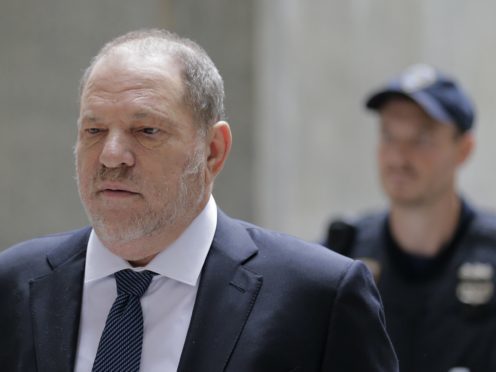Prosecutors have dropped part of the criminal case against Hollywood producer Harvey Weinstein.
The development was announced in a New York court with Weinstein looking on.
A judge agreed to dismiss allegations by one of the three accusers in the case, Lucia Evans.
In a story published a year ago, Ms Evans told The New Yorker that Weinstein sexually assaulted her during a meeting at his office in 2004.
Remaining charges include allegations that Weinstein raped a woman in 2013 and sexually assaulted a different woman in 2006. Weinstein says he is innocent.
His lawyer, Benjamin Brafman, said in court that he believes Ms Evans lied to the grand jury about what happened.
Assistant District Attorney Joan Illuzzi-Orbon told the judge that prosecutors would not oppose dismissal of the count in the case involving Ms Evans. She insisted the rest of the case, involving two other accusers, was strong.
“In short, your honour, we are moving full steam ahead,” she said.
But Mr Brafman told the judge he believed Ms Evans lied and that a police detective had corruptly attempted to influence the case by keeping a witness from testifying about her mis-statements.
“The integrity of these proceedings has been compromised,” he said.
Weinstein’s lawyers and prosecutors have been wrangling over the part of the indictment pertaining to Ms Evans’s allegations over the last few weeks in closed-door meetings and sealed court papers.
Some media outlets reported that there were problems with witness interviews done by one of the lead police detectives handling the investigation. Others said prosecutors had discovered old personal writings by Ms Evans in which she suggested her encounter with Weinstein was consensual.
In a statement, a lawyer for Ms Evans said she was disappointed by the decision to “abandon” her.
“Let me be clear: the decision to throw away my client’s sexual assault charges says nothing about Weinstein’s guilt or innocence. Nor does it reflect on Lucia’s consistent allegation that she was sexually assaulted with force by Harvey Weinstein,” said attorney Carrie Goldberg. “It only speaks volumes about the Manhattan DA’s office and its mishandling of my client’s case.”
Speaking outside court, Mr Brafman said that “while the crime of sexual assault is certainly serious, to falsely accuse someone of sexual assault is equally serious”.
He also insisted the developments were not an attack on the #MeToo movement, adding: “If a movement is used to help level the playing field for women, that is good, but if the movement is used to pressure prosecutors to proceed with the filing of false criminal charges against a defendant, that often results in a miscarriage of justice.”

Weinstein, who has denied all allegations of non-consensual sex, still faces charges over allegations that he raped an unidentified woman in his hotel room in 2013 and sexually assaulted a different woman in 2006.
He has pleaded not guilty and is free on $1 million bail.
Images of Weinstein in handcuffs were seen by many women as a cathartic moment in the #MeToo reckoning. The collapse of part of the case against him could mean trouble for the prosecutor.
Manhattan District Attorney Cyrus Vance has already been fiercely criticised for declining to prosecute Weinstein when an Italian model accused him of grabbing her breasts in 2015.
At the time, Mr Vance cited a lack of supporting evidence, despite the existence of a clandestinely made recording of Weinstein discussing the episode with the woman.
In the months after The New York Times and The New Yorker began publishing stories about Weinstein’s interactions with women, activists pressured Mr Vance to bring charges as dozens of people came forward with claims of sexual misconduct against him.
New York Police officials poured on the pressure too, saying publicly that they believed they had gathered ample evidence to make an arrest.
